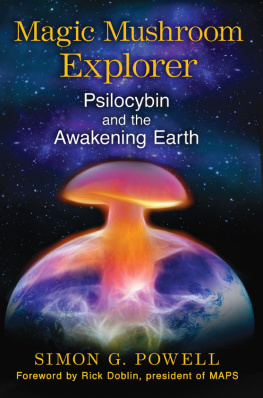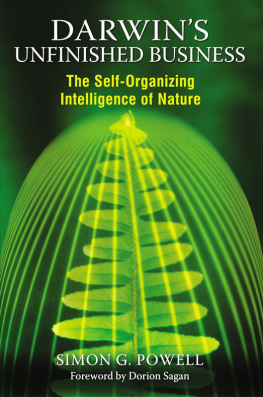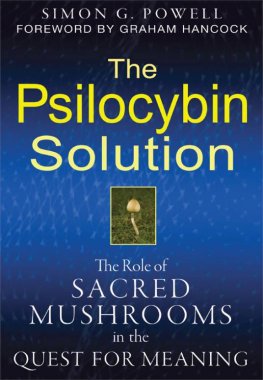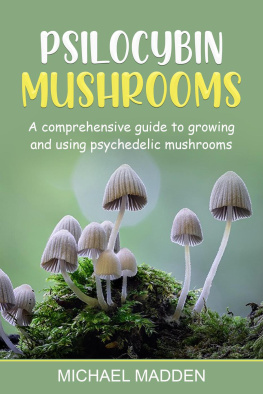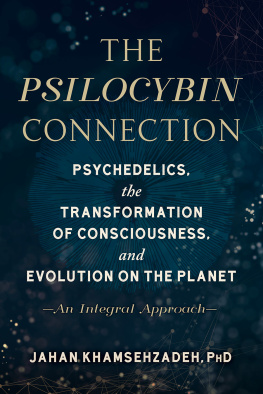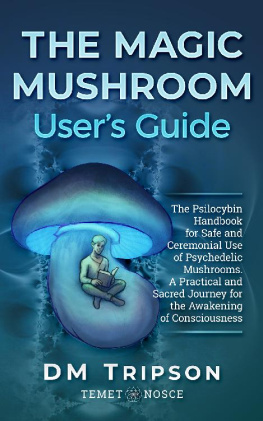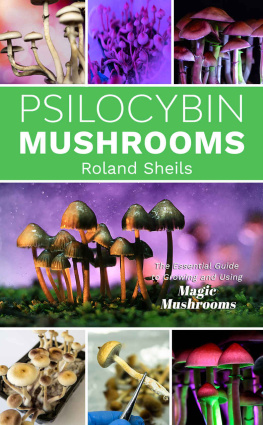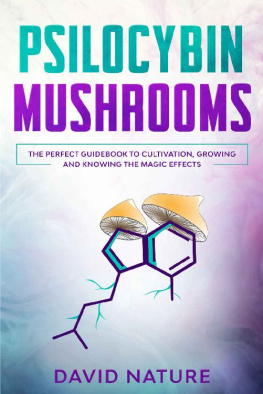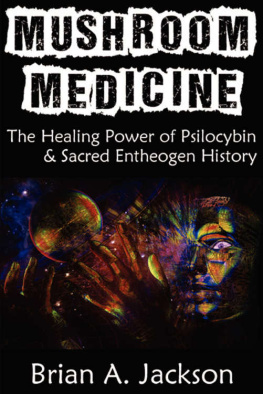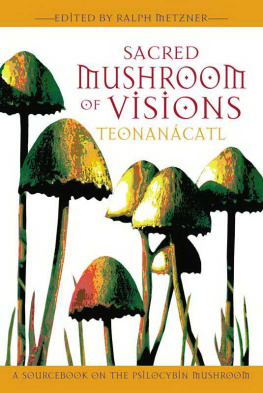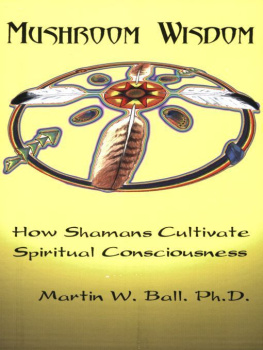
Magic Mushroom Explorer
Psilocybin is getting a lot of attention lately as its therapeutic potential is being rediscovered after decades of not simply neglect, but of active suppression and prohibition. Those who follow this blooming resurgence of psychedelic research will already be aware that this simple, nontoxic molecule may harbor the potential to treat addictions, depression, traumatic memories, and even blunt the sting of death itself by alleviating the existential anxiety and loneliness of terminally ill patients about to cross that final threshold. What is rarely acknowledged in the staid scientific literature of clinical studies and neuroscientific assessments of psilocybin is that these emerging therapeutic applications, as important and promising as they are, barely scratch the surface of what we can learn from the intersection between a suitably primed hominid nervous system and this ancient fungal teacher, far older and far wiser than our species.
What Simon G. Powell articulates clearly and argues compellingly in Magic Mushroom Explorer is that psilocybin not only opens the portals to visionary dimensions but also constitutes a tool for the exploration of reality, a tool every bit as important to scientific inquiry as the telescope or the microscope. While these instruments open sensory windows on realms of cosmic vastness or microscopic dimensions, psilocybin is another kind of lens, a lens that enables us to interface with and engage in dialog with the inherent intelligence that permeates all of nature.
Simons book discusses all these highly charged ideas in a charming, easily understood, humorous, and utterly engaging manner that will resonate with experienced psilocybin explorers and that may just open the eyes of those who are not (yet) experienced to the possibility that nature is richly blessed with unimagined realms of intelligence, mystery, and complexity. With this book, his third, Simon has knocked it right out of the park (or perhaps right into the park, since parks seem to be the frequent home of his little fungal friends).
DENNIS MCKENNA, PH.D., ETHNOPHARMACOLOGIST, COFOUNDER OF THE HEFFTER RESEARCH INSTITUTE, AND AUTHOR OF BROTHERHOOD OF THE SCREAMING ABYSS
Here is the thought-provoking description of the authors spiritual quest, his profound discoveries, and their implications for renewed research with psychedelic substances, reawakening us to the sacredness of nature and life itself. In and through the pitfalls and pinnacles of his journey is the transformation of a curious and courageous young man into a mature modern prophet and social critic. Fascinating read!
WILLIAM A. RICHARDS, PH.D., JOHNS HOPKINS SCHOOL OF MEDICINE
Simon G. Powell, a credible psychonaut, has written a book that should be welcomed as our overpopulated species attempts to transition to sane drug policies and respect for native wisdom, integration with nature, and, ultimately, planetary maturity and ecological stability.
DORION SAGAN, AMERICAN SCIENCE WRITER, ESSAYIST, AND THEORIST
The author informs, muses, and amuses as he chronicles his psilocybin explorations and insights into natural intelligence. He writes in joyfully plain English, tells compelling stories, and gets excited by all of life. Definitely outside the box.
JEREMY NARBY, AUTHOR OF THE COSMIC SERPENT
Simon G. Powells most profound insight is that nature is intelligent, not in the way that we think of intelligence as confined to the human mind, but that intelligence is an intrinsic property of the whole of nature. He calls for a new science of psilocybinetics that views life anew under the perceptual lens afforded by the mushroom. It is an interesting and provocative read!
DAVID E. NICHOLS, PH. D., PRESIDENT AND COFOUNDER OF THE HEFFTER RESEARCH INSTITUTE
Contents
Foreword

By Rick Doblin, President of MAPS
Simon G. Powell is a literary and cultural figure visioning a new reality. Magic Mushroom Explorer: Psilocybin and the Awakening Earth is devoted to the authors search for truth, using psilocybin as a guide. Simons personal experiences and deep connection to nature and psilocybin balance his philosophic inquiry and political commentary. Innovative concepts such as natural intelligence (chapter 3) and the sacred pattern (chapter 5) are informed both by psychedelic journeying and evolutionary science. Firsthand experiences are recalled throughout the book. Psilocybin is at the crux of Simons search for truth, and both the substance and the man come through in this writing.
For every advance in psychedelic science there are many setbacks. In 2005 Simon, who is British, presented the Powell Report (chapter 4) to the House of Commons in an attempt to keep fresh psilocybin mushrooms legal or at least to persuade the U.K. government to gather more safety evidence (unlike other countries, fresh unprocessed psilocybin mushrooms were legal to possess in the U.K. at that time). On July 18 of that year, the U.K. Home Office labeled the mushroom as Class A, illegal. Simon and I share a common goal of ending prohibition and making psychedelics legally available. This book is one effort to communicate the benefits of psychedelics and the harsh reality of their criminality.
The 1950s and early 1960s were a time of discovery. Psychedelic research flourished. A renewed focus on health and well-being emerged. People embarked on personal and spiritual exploration, both with and without the aid of psychedelics. In the mid-1960s and 70s, fear began driving drug policy, escalating the War on Drugs and rendering the use of psychedelics for research into therapeutic, religious, and neuroscience purposes taboo, as well as outlawing all nonmedical use. The Controlled Substances Act was passed in the United States in 1970. In 1973 the U.S. Drug Enforcement Administration (DEA) was established, merging the Bureau of Narcotic and Dangerous Drugs and other federal offices. Marijuana, LSD, and psilocybin were criminalized.
We are progressively recovering from the trauma caused by years of misinformation and reactionary politics. Since 1986, when I founded MAPS (Multidisciplinary Association for Psychedelic Studies), we have made several breakthroughs. None of the drug breakthroughs was a big surprise; psychedelic therapists and users knew the benefits. The most celebrated breakthroughs have been bureaucratic and political. The year 2014 brought forth exceptional success at MAPS: we published our study on LSD-assisted psychotherapy in subjects with anxiety from life-threatening illness, which was the first new study of the therapeutic use of LSD in more than forty years; after twenty-two years MAPS overcame the emphatic and antiscientific blocking by the National Institute on Drug Abuse (NIDA) and the DEA of our medical marijuana research and obtained approval for our marijuana/PTSD Phase 2 drug development study in veterans; our MDMA-assisted psychotherapy research expanded into an international series of Phase 2 MDMA/PTSD pilot studies; a new study was initiated into the use of MDMA in reducing social anxiety in adults with autism; and two new studies were planned for the use of MDMA in subjects with end-of-life anxiety related to life-threatening illnesses and tinnitus. Similarly, the Heffter Research Institute has supported studies of psilocybin for the treatment of anxiety associated with cancer, alcohol, and tobacco addiction, and for catalyzing spiritual experiences; and the Beckley Foundation has initiated LSD and psilocybin brain scan studies. There is now more psychedelic research taking place than at any time in the last forty years. The messages and understandings written in this book will further facilitate the expansion of psychedelic research and the mainstream use of psychedelics for beneficial purposes.
Next page
